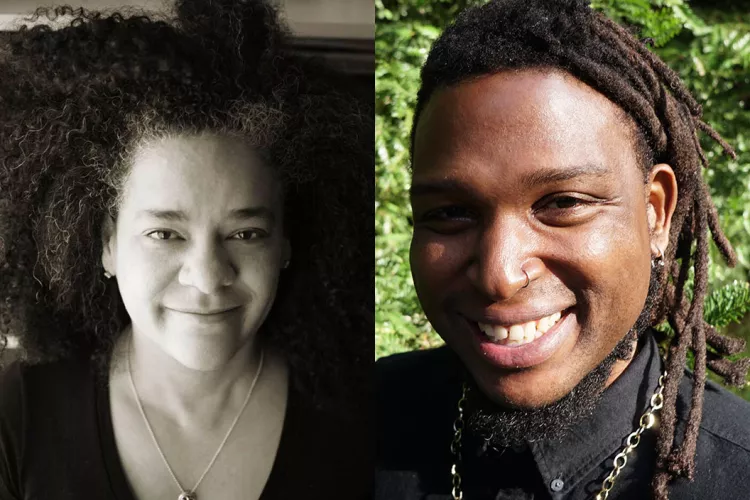Aydelotte Project Examines Race, Racism, and the Liberal Arts

Scholars Katherine McKittrick (left) and Nick Mitchell will be part of a conversation on race and racism in liberal arts.
In what ways have liberal arts institutions silenced the voices and histories of people of color?
That’s a question at the heart of “Race, Racism, and the Liberal Arts,” a new project undertaken by Swarthmore’s Aydelotte Foundation. By bringing together work from scholars, researchers, and even nonacademics, the initiative aims to examine how the views of underrepresented communities have been overlooked or pushed aside within the liberal arts and higher education.
“Conversations about how racism unfolds in histories that scholars narrate about their academic disciplines are often isolated to that particular discipline,” says Andy Hines, associate director of the Aydelotte Foundation, an interdisciplinary research center that supports the creation and dissemination of knowledge about liberal arts. “We think that bridging those sometimes isolated conversations will lead to a more comprehensive understanding of how the contemporary university works and the ways that racism, as well as other modes of marginalization, persists.”
Examinations like this are especially urgent in the wake of the “cascading crises of 2020,” which “made painfully visible the fractured inequity of civil society in the United States,” Hines adds. “Despite the perception otherwise, colleges and universities are not insulated or apart from the injustice that grips American society.”
For its first public event, the project will host two scholars for a virtual “Conversation on Higher Education, Racism, and Disciplinary Knowledge,” set for Tuesday, Feb. 23 at 7 p.m. ET. Moderated by Assistant Professor of Sociology Nina Johnson, the conversation will feature Katherine McKittrick, a groundbreaking scholar in the field of Black geographies, and Nick Mitchell, who has researched the ideological and institutional limits of Black studies as it has been approached in U.S. academia.
“Mitchell and McKittrick rigorously attend to Black movements for liberation and surface the complexity and possibility of social, political, and educational critique that forms in the practice of Black life,” Hines says. “We hope that their conversation with Nina Johnson will touch on these connected aspects of their work and open up a discussion about how any inquires into race and racism in the liberal arts must attend to the connections between ideas and their material ramifications, the institutions in which those ideas are developed and reproduced, and the related struggle for liberation.”
The Aydelotte conversation is co-sponsored by the President’s Fund for Racial Justice, the Black Cultural Center, the Lang Center for Civic and Social Responsibility, and the Black Studies and Gender & Sexuality Studies programs.
It is also part of a series of virtual events commemorating Black History Month at Swarthmore College. The full schedule includes:
- Thursday, Feb. 18, 7 p.m.: “Praise Song for the Everyday”: A presentation by poet Joshua Bennett, the Mellon Assistant Professor of English at Dartmouth College
- Monday, Feb. 22, 7 p.m.: An Evening with Filmmaker Garrett Bradley, director of the award-winning documentary Time
- Tuesday, Feb. 23, 7 p.m.: Conversation on Higher Education, Racism, and Disciplinary Knowledge, featuring professors Katherine McKittrick of Queen’s University and Nick Mitchell of the University of California, Santa Cruz, and moderated by Swarthmore professor Nina Johnson
- Friday, Feb. 26, 7 p.m.: Black Music Excellence Through the Ages, with singer Richelle Claiborne
All events are free and open to the public, though some registration may be required. For more information, visit swarthmore.edu/bcc.



